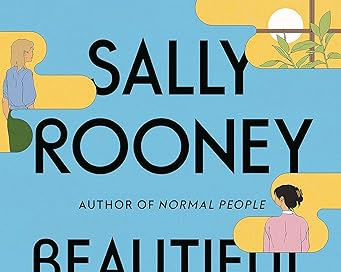Happy April, everyone. As someone who lives in Florida, I can attest that April is not the cruelest month — August is! So I’m making the most of the beautiful weather before summer crushes my soul.
I happen to be in the middle of two giant books, but I didn’t want to leave you empty-handed this month. Here’s a review I posted on Instagram a little while back. As Hipennial as she may be, Rooney is a fascinating talent and worthy of a spot on anyone’s Substack.
XO,
Jesse
A couple of years ago I dared to pick up a Rooney novel even though all the millennials were raving about her—and what do you know? Soon I was counting myself among her fans, which seem to be largely teenage and 20-something ladies, giving me the same awkward feeling I had when I liked Lana Del Ray for five minutes and was asked to chaperone two teenage girls to one of her concerts in Miami. In short, I was looking forward to this one. But alas … diminishing returns.
Like her first book, Beautiful World, Where Are You centers on two young Irish couples, but here Rooney experiments with form, alternating between epistolary emails and a curiously limited omniscient third person point of view, which reminds me of the rare but uncanny narrator in Woolf’s The Waves.
Beautiful World seems more like a Rooney facsimile rather than a work in itself. All the classic Rooney-esque ingredients are there: the spare, “Marxist” prose, the teen-friendly domestic drama plot line, the bland detailing of objects, intimations of extreme leftist politics … but with a note of falseness. Still, the book retains her most interesting signature touch—the peculiar sense of parsing the contemporary world through the lens of the classic novel.
Indeed, Beautiful World feels less like a twenty-first-century novel than a nineteenth-century novel forward-engineered to contain all the anxieties and peculiarities of the digital age, which has the effect of defamiliarizing contemporary life at the same time that it places it within the inexorable march of human history—humanizing as well as illuminating it.
How curious it is, Rooney seems to be saying, that even now, more than 200 years after the rise of the novel, human beings are still so preoccupied by love and coupling. Personally I find it more interesting that in an age where we are less hindered than we’ve ever been by class or wealth or the prejudices of society in the pursuit of happiness, we are thwarted by complexities and barriers of our own creation, which if closely examined would feel as contrived as the plot in Beautiful World.
… Beautiful World feels less like a twenty-first-century novel than a nineteenth-century novel forward-engineered to contain all the anxieties and peculiarities of the digital age, which has the effect of defamiliarizing contemporary life at the same time that it places it within the inexorable march of human history …
In reading this book I was reminded of Goethe’s Elective Affinities, a sort of novel-with-a-thesis about two couples, who seem more like hypothetical propositions than real people. But instead of philosophical methodology, Rooney’s plot is driven by convenient miscommunication. (“If only they would just tell each other how they feel, then they would see they were perfect for each other!”)
The only thing that kept me going was the brilliant Aoife MacMahon’s reading, whose interpretations of the characters seemed to contain more emotional truth than the writer’s renderings of them. It gave me the sense of watching a badly written but well-acted TV show only because you want to know what happens to the characters.
Takeaway: If you still haven’t read Rooney, skip this one and listen to Conversations with Friends on audiobook instead.



